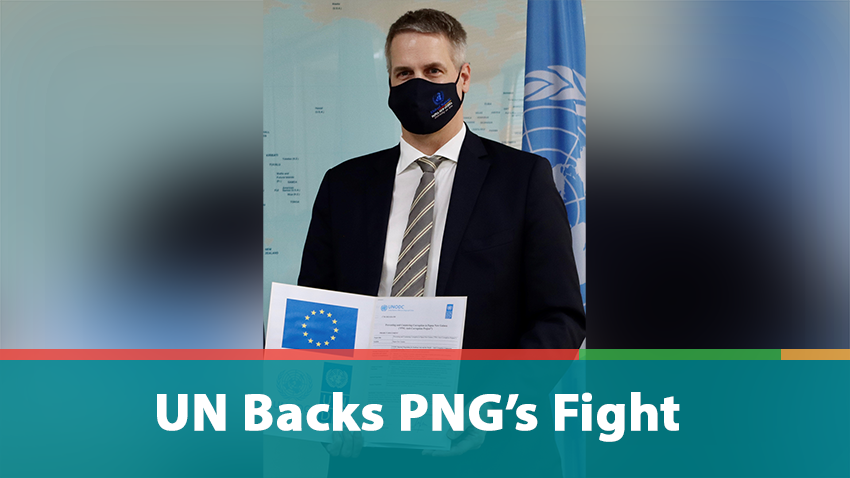
The United Nations Development Programme (UNDP) is the global development network of the United Nations (UN) that advocates for change.
In supporting this, the UN has led a joint project on preventing and countering corruption in Papua New Guinea and adding significant resources to its current efforts.
The new investment valued at EUR 5.4 million represents a major commitment by the UN, the European Union and PNG Government to tackle corruption.
This will be channeled to the Government of PNG to implement key components of the Government’s National Anti-Corruption Strategy and Plan of Action.
“I am honoured to be representing the United Nations at this launch of the UN Joint Project on Preventing and Countering Corruption in Papua New Guinea,” said Dirk Wagener, UNDP Resident Representative.
UNDP and UN Office of Drugs and Crime (UNODC) will implement the Project jointly over the next three years in close partnership with the Government, including the Department of Justice and the Attorney General.
“I thank Minster Bryan Kramer, who heads DJAG, for the ongoing partnership of his Ministry with our UN team. DJAG has been spearheading the national fight to tackle corruption and we look forward to strengthening that cooperation through this project,” Mr Wagener said.
Mr Wagener said: “As we all are aware, corruption benefits a few criminals, but disadvantages all others. Government money that is lost to corruption is money that is no longer available to be spent on health, education, and basic services that the people of PNG need.
“It is very clear that corruption has impeded PNG’s development and, if not addressed, will impact on PNG’s achievement of the Sustainable Development Goals.”
He said the Sustainable Development Goals-16 recognizes the centrality of corruption to development progress, which includes specific targets requiring countries to address bribery and corruption, and to promote transparency and accountability. This Joint Project will support PNG to meet those targets.
“I am proud to say that Papua New Guinea was the first country in the Pacific to ratify the UN’s Convention against Corruption. PNG signed the Convention in 2004 and ratified it in 2007.
The partnerships that UNDP and UNODC have developed over the last decade with PNG anti-corruption actors has now crystalized in the launch of the Joint Anti-Corruption Project.
The Project has four outcomes, all of which are designed to come together to strengthen local partners’ capacities to tackle corruption effectively. The Outcomes are:
- Outcome 1, designed to support the implementation in monitoring National Anti-Corruption Strategy Plan of Action, which has now been endorsed by the Government
- Outcome 2 will focus on establishing a operational Independent Commission Against Corruption, drawing on comparative good practice from around the world and the region.
- Outcome 3 will focus on strengthening existing anti-corruption investigation and prosecution actors, who still have a critical role to play in addressing corruption, even after the establishment of the ICAC. In particular, the Project will work with the RPNGC’s national and provincial anti-corruption and fraud units and the Office of the Public Prosecutor.
- Outcome 4 recognizes the critical role that the public and civil society have to play in preventing corruption from occurring at all. The Project will work with a range of civil society actors, with a particular focus on NGOs, young people, the media and the private sector.
“We are confident that the UN will play its part through this Project in working with PNG officials and community partners to strengthen the national efforts to stamp out corruption. “The PNG people deserve no less and make sure that this project is impactful and leads to real changes in the lives of people across the country.”
